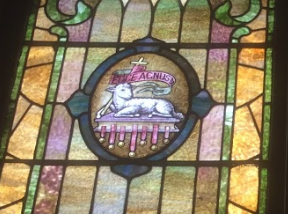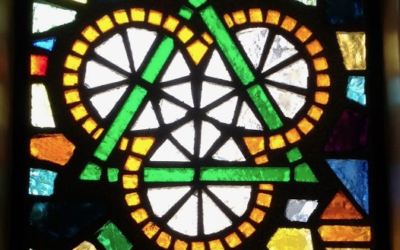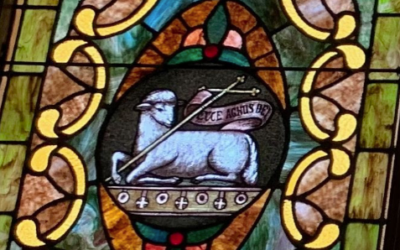God’s Kingdom Grows
Sunday, June 13, 2021
Watch the service

Read the sermon
The Word Bears Fruit
Farming isn’t easy. Years ago, we were in a greek class at MLC. And, for some reason, we were talking about investing. And one of the students in the class challenged the professor. He told the professor that we shouldn’t be investing in the stock market because it’s gambling. The professor responded in a very interesting way. He told us all that his dad was the biggest gambler he ever knew. Every year he would spend mass amounts of money on bags and bags of seed. And then he would put those seeds in the ground simply trusting that there would be enough rain and sun. And, for me it was the powerful lesson that farmers have to use their backs. But they also have to use their brains. Farming isn’t easy. It’s not easy on your back. It’s not easy on your brain. And this morning Jesus uses that fact as a way of speaking about growing—but not the growing out there in the field. Instead, he speaks about the growing here in our hearts through faith. In Mark 4, we read: “26 He also said, “This is what the kingdom of God is like. A man scatters seed on the ground. 27 Night and day, whether he sleeps or gets up, the seed sprouts and grows, though he does not know how. 28 All by itself the soil produces grain—first the stalk, then the head, then the full kernel in the head. 29 As soon as the grain is ripe, he puts the sickle to it, because the harvest has come.”” (Mark 4:26–29 NIV11-GKE)
Here Jesus tells us a story. The farmer goes out and he puts the seeds in the ground. He wakes up and he goes to sleep. And out there in the field the seed grows. How—he doesn’t know. What he knows and counts on is the that. The how is up to God. The same is true when God’s word is read, shared, and thought on. It bears fruit. The Holy Spirit gets his work done.
But, my friends, there are times we have challenges to this. The temptation we face is to be frustrated that we do not see the how. And when we do not see how the Holy Spirit is getting his precious work done we can end up not trusting that the growth will happen at all.
And, to make matters worse, the world around us so very often has a competing “how” as to what is right and what pans out in reality. There are many examples we could look at in our every day lives. Take, for example, God’s path for marriage. God’s word tells us that a man meets a woman, or a woman meets a man. They date. They make a public promise to be faithful to each other. Then they get live out those promises knowing that the Lord will bless their promise. But the world around us has a different wisdom to provide. They tell us that it’s ok to pretend to be married when we are not, or to never plan to get married at all. But, my dear friends, realize that the conclusion they reach is not without reason. The fact that drives their action is that so many marriages end up in divorce. And they conclude that if that’s the case, then why try? Why trust that God will keep his promises, especially when we cannot see the how? And yet, that’s exactly what Jesus asks us to do. For he promises that just as the seeds in the soil grow without you seeing it, so also, God’s word grows in you and he gets his work done secretly, silently, stealthily, without you even knowing about it or seeing it.
And my dear friends, it’s important for us to know that when we have these temptations to need to know the how in the face of the world offering a competing how, we are not alone. Jesus in his state of humiliation set aside the use of his divine abilities for the most part. He did this so that he could be tempted and tested in our place and yet trust. Think of Jesus in the garden of Gethsemane. He prays that his Father would take away the cup, but then he follows up with such amazing trust. He says, ‘yet, not as I will, but as you will.’ Jesus did not demand to know the how. It was enough for him to know the that. Jesus does this in our place. And the result is that, for all the times we wanted to see the how instead of trusting that God knew what he was doing—those sins are forgiven. The word bears fruit. God is the one who knows how this happens. And he gives us faith to believe that it will happen. But, these words continue: “30 Again he said, “What shall we say the kingdom of God is like, or what parable shall we use to describe it? 31 It is like a mustard seed, which is the smallest of all seeds on earth. 32 Yet when planted, it grows and becomes the largest of all garden plants, with such big branches that the birds can perch in its shade.”” (Mark 4:30–32 NIV11-GKE)
Notice here how Jesus tells us the opposite parable. In the first parable the crop grows and you don’t see it. Here in these words the plant grows and you do see it. But here too, there is the temptation. And it’s a real one. It’s the temptation to forget the how and the who. We face the real temptation to forget that God is the one who provides the growth. And we forget the how. We forget that God’s word is what bears the fruit. And when this begins to happen in our hearts and in a Christian congregation is set a chain reaction into play. First, we forget what God’s word did. It produced fruit. My dear friends in Christ, look at the history of our own congregation. Do you think that Pastor Baur—the one from 140 years ago would have been able to picture or imagine where we are today? Would he have been able to imagine that there were so many people in his church that they would be able to build a new building and share God’s word for decades to come? No, the work the Holy Spirit did was invisible. We are the ones who get to see the growth that happened like looking at a tree not as a sapling, but instead as a full-grown tree. But our temptation is to first forget.
Second, our temptation is to give into defeatism. Defeatism is where you give up on the battle before the battle is done or before the battle is even started. And, my dear friends, I’ve heard that sort of language here. People have told me, “Pastor I remember when these pews were full.” And where that can lead to is a strange sort of “if only” sort of longing for the past. And if that takes hold, where it leads to is a “why bother” sort of conclusion. The present church becomes a future cemetery. We start thinking that it’s undeniable and inevitable that our church will shrink. And since that’s the case, we need to save up a bunch of money so that there will be someone to bury the last person and then turn the lights off.
My dear friends, that’s why what Jesus shares here is so amazing and wonderful. Where God’s word is shared the Holy Spirit will produce fruit. He will produce it where and when and how he wills. But he will produce it. And with this parable he gives us the opportunity to remember what our Lord has done here in our church. 100 years ago when diphtheria and other diseases plagued the prairie and families were losing their children, they trusted that God. They trusted that he would first cause them to grow on the inside, then on the outside. And he kept his promise.
Jesus reminds us of this by having us look to our past. But he also has us look to our future. When I lay a loved one’s remains to rest in our cemetery I read from the book of Revelation. And one of the reasons I do this is to remind us all what the numbers will look like in heaven. Thousands, 10,000 x 10,000 there in heaven. The Holy Spirit produced the fruit first secretly and silently. And we did not know how. But there, on the other side, in heaven, all will see the result.
Each of us wrestles with this defeatism. And that’s why we need to remember that Jesus defeated defeatism by rising from the dead. But, what’s even better, is that he gives us tools to deal with defeatism. And one of them is simply remembering and rejoicing. Our forefathers did not know the how. But, by God’s grace they trusted the that. And now that we see some of those results, let us remember and rejoice. For our good and gracious Lord knows what he is doing. And he is doing his secret and silent work of producing fruit in us through his word for our good. So, God’s word produces fruit. God is the one who knows how it grows. Let us be the ones who continually remember and rejoice that he grew his word in us. Amen.



